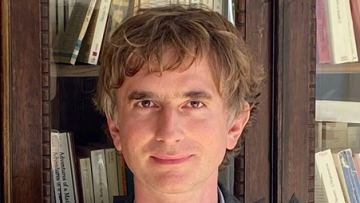Emmanuel Breuillard, the Sadleirian Professor of Pure Mathematics in Cambridge, has been appointed to the Professorship of Pure Mathematics in Oxford starting on 1 January 2022. Held by Professor Roger Heath-Brown FRS from its inception in 1999 until his retirement in 2016, the Professorship of Pure Mathematics is one of the most prestigious statutory positions in Oxford. Professor Breuillard will be a fellow of Worcester College.
Curvature is a way of measuring the distortion of a space from being flat, and it is ubiquitous in Science. Ricci Curvature, in particular, appears in Einstein’s equations of General Relativity. It controls the heat diffusion in general ambient spaces and it plays a fundamental role in Hamilton-Perelman’s solution of the Poincaré conjecture and of Thurston’s geometrisation conjecture.
Equivariance in Deep Learning
Abstract
One core aim of (supervised) machine learning is to approximate an unknown function given a dataset containing examples of input-output pairs. Real-world examples of such functions include the mapping from an image to its label or the mapping from a molecule to its energy. For a variety of such functions, while the precise mapping is unknown, we often have knowledge of its properties. For example, the label of an image may be invariant to rotations of the input image. Generally, such properties formally correspond to the function being equivariant to certain actions on its input and output spaces. This has led to much research on building equivariant function classes (aka neural networks). In this talk, we survey this growing field of equivariance in deep learning for a mathematical audience, motivating the need for equivariance, covering concrete examples of equivariant neural networks, and offering a learning theoretic perspective on the benefits of equivariance.
14:00
Dimensions of Iwasawa algebras and their representations
Abstract
The Iwasawa algebra of a compact $p$-adic Lie group is fundamental to the study of the representations of the group. Understanding this representation theory is crucial in progress towards a (mod p) local Langlands correspondence. However, much remains unknown about Iwasawa algebras and their modules.
In this talk we'll aim to measure the size of the Iwasawa algebra and its representations. I'll explain the algebraic tools we use to do this - Krull dimension and canonical dimension - and survey previously known examples. Our main result is a new bound on these dimensions for the group $SL_2(O_F)$, where $F$ is a finite extension of the p-adic numbers. When $F$ is a quadratic extension, we find the Krull dimension is exactly 5, as predicted by a conjecture of Ardakov and Brown.
Detecting topological features in the boundary of a group
Abstract
The Gromov boundary of a hyperbolic group is a useful topological invariant, the properties of which can encode all sorts of algebraic information. It has found application to some algorithmic questions, such as finding finite splittings (Dahmani-Groves) and, more recently, computing JSJ-decompositions (Barrett). In this talk we will introduce the boundary of a hyperbolic group. We'll outline how one can approximate the boundary with "large spheres" in the Cayley graph, in order to search for topological features. Finally, we will also discuss how this idea is applied in the aforementioned results.



